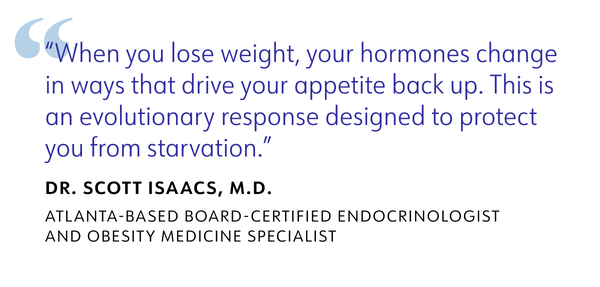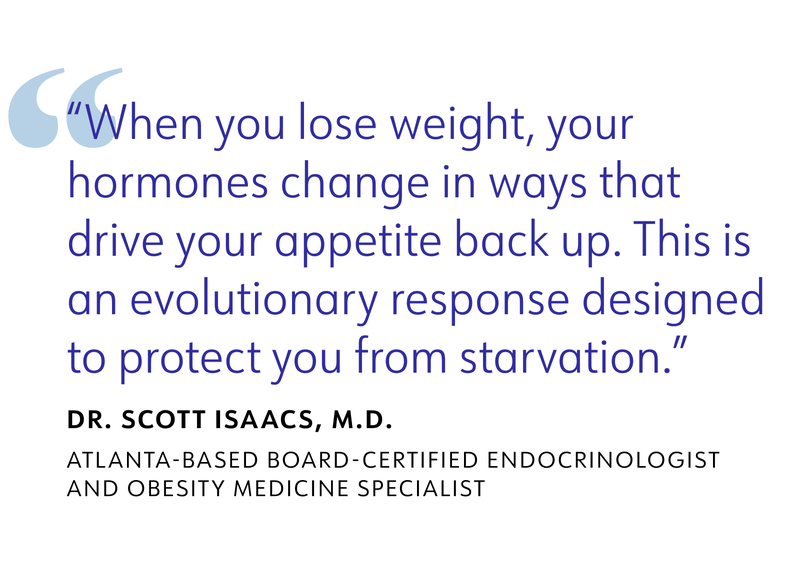The truth about hormones and weight loss


Just when you thought you knew the main factors that could influence your weight — calories, metabolism, and good old-fashioned genetics — hormonal imbalances enter the chat. Wellness influencers on social media share that fixing their out-of-balance hormones helped them to (finally) lose weight. Books proclaim that your best body awaits but not until you optimize those hormone levels.
What is a hormonal imbalance?
Hormone levels tend to naturally go up and down depending on many factors, including your environment and what time of day it is. Having those hormone levels stay where they should be supports your overall health, says Amy Goss, Ph.D., R.D., assistant professor in the Department of Nutrition Sciences at The University of Alabama at Birmingham. This is known as your overall hormone balance, which Goss defines as having hormones within normal ranges that are functioning adequately (something that can look different from person to person). But one hormone going off-kilter can have a cascading effect since hormones are constantly interacting with each other. And when too many hormone levels are disrupted, it can cause what’s known as a hormonal imbalance.


Can hormone imbalances make it tougher to lose weight?
What do balanced hormone levels have to do with weight? Certain hormones can affect your appetite, your metabolism, and how well your body processes nutrients, explains Goss. For example, whenever you eat, your body releases a bunch of hormones, including insulin (to push blood sugar into cells for energy) and appetite hormones (to signal to your brain when you’re hungry or full). While it’s uncommon, if these hormones aren’t working at optimal levels, you might eat more than you otherwise would or store more fat after a meal.
Which hormones are linked to weight?
Here’s a closer look at the specific hormones that may impact your weight:
- Ghrelin and leptin are both known as appetite hormones. Ghrelin stimulates hunger and encourages your body to store fat, while leptin suppresses your appetite by telling your brain that you’re full. These hormones can cause weight gain if your ghrelin levels are elevated or you have what’s known as leptin resistance, which is when you have high levels of leptin but your brain isn’t receiving the signals that you’re full.
- Insulin pushes glucose into your cells, where it can be used for energy or stored for later. If your cells don’t respond to insulin well, a condition known as insulin resistance, your body will release more and more of it, and glucose levels will rise. This can lead to prediabetes and diabetes as well as weight gain since the excess glucose in your blood ends up getting stored as fat.
- Thyroid hormones, like T2 and T3, impact your weight by regulating energy expenditure, or how many calories you burn. When your thyroid hormones are elevated, your resting energy expenditure is higher and you burn more calories.
- Glucagon might be a lesser-known hormone, but it plays a role in controlling blood glucose levels and affects hunger by suppressing ghrelin, decreasing your appetite.
- Estrogen, the female sex hormone, affects how fat is metabolized and stored in the body. It declines during menopause, which results in more fat stored around your midsection. That estrogen drop can also contribute to poor sleep, which can affect appetite hormones and make you hungrier during the day, says Goss.
- Testosterone, the male sex hormone, is also connected to belly fat. When levels are low, abdominal fat storage grows, partly due to testosterone’s hand in blood sugar control and your ability to maintain muscle mass. (On the flip side, women with PCOS have more belly fat when their testosterone levels are higher than average.)
- Cortisol, which is the stress hormone, has both a direct and an indirect effect on weight. When you feel stressed out for a long period of time, something known as chronic stress, your body’s cortisol levels remain elevated. Research shows this can cause your body to store more abdominal fat, ultimately raising your risk for obesity. High cortisol can also impact weight loss by affecting your behaviour — you’re likelier to have poor sleep and eat more when you’re stressed, for example.
While the above seems to give hormones a lot of power in weight management, they likely aren’t going to be the deciding factor in whether you reach your weight loss goals. “For most healthy individuals, slight changes in hormone levels alone aren’t enough to cause weight gain or loss,” says Goss. In other words, when people say they look and feel better after focusing on their hormone levels, it might have just as much to do with their renewed focus on their overall health — something that supports weight loss on its own.
Which hormonal conditions can cause weight gain?
For people with certain health conditions, abnormal hormone levels are more directly linked to weight gain. Insulin resistance is a complex condition that interferes with your body’s ability to respond to insulin — a hormone produced in the pancreas — the way it should. (Insulin helps protect your body from receiving too much sugar.)
Another example is polycystic ovary syndrome, PCOS, which leads to higher levels of insulin (which regulates blood sugar and fat storage) and androgen (a group of sex hormones including testosterone that are linked to gaining belly fat). Some research also suggests that those with PCOS have altered appetite hormones that may contribute to overeating. “This can make it really challenging for some women with PCOS to lose weight,” says Goss.
How does weight loss impact your hormones?
Losing weight can have both positive and negative impacts on your hormone levels. While it can return some hormones, like insulin and testosterone, back to more optimal levels, it can also cause a shift in other hormones that may make you feel hungrier. “When you lose weight, your hormones change in ways that drive your appetite back up,” explains Atlanta-based, board-certified endocrinologist and obesity medicine specialist Dr. Scott Isaacs, M.D. Specifically, hormones that make you feel full (like leptin) decrease, while ghrelin (your appetite-stimulating hormone) increases, he says. This is an evolutionary response designed to protect you from starvation, explains Isaacs.
While you can appreciate the concept behind this — if you lived long ago and couldn’t find enough to eat, you’d want your body to hold on to fat — it’s not so helpful if you’re trying to lose weight. This is where lower calorie, higher volume foods, such as fruits and veggies, lean proteins, and whole grains, can come in because they can help fill you up, Isaacs says. Consuming the right amount of protein and some healthy fats can also help keep you feeling full for longer.
How to support your hormonal health
When it comes to helping your hormones function as well as they should, healthy habits go a long way.
- Get enough sleep. Keeping a consistent sleep schedule and getting enough sleep each night (at least seven hours for most adults) is crucial for regulating hormones that are linked to your circadian rhythm–things like cortisol, leptin, and ghrelin. If you’re going through menopause, you may notice your sleep is off, perhaps from night sweats or insomnia, so talk to your doctor about treatment options that can help.
- Take a break from stress. The less stress you feel, the lower your cortisol levels will be. Going on a walk, calling a good friend, practicing deep breathing, or having a daily yoga practice can help you deal with stress that might otherwise derail your healthy habits.
- Move your body every day. Regular physical activity may help regulate appetite hormones like ghrelin. For example, one small study showed that exercise reduced ghrelin levels and hunger both during and after the workout. The key to sticking with an exercise plan is finding an activity you enjoy. Not sure what that is? Head to WeightWatchers®’ Workout Guides for some inspiration.
The bottom line
If you believe that a hormonal problem may be impacting your weight, don’t try to address it on your own. Talk to your doctor, who may refer you to an endocrinologist to see if you have a metabolic disease or thyroid disorder affecting your weight.
Hormone basics: Endocrine Society. (2022.) “Patient Resources: Hormones and Endocrine Function.” https://www.endocrine.org/patient-engagement/endocrine-library/hormones-and-endocrine-function
Thyroid: American Thyroid Association. “Thyroid and Weight.” https://www.thyroid.org/thyroid-and-weight/
Insulin and Weight: Centers for Disease Control and Prevention. (2021.) “Insulin Resistance and Diabetes.” https://www.cdc.gov/diabetes/basics/insulin-resistance.html
Leptin: Obesity Review. (2007.) “The role of leptin and ghrelin in the regulation of food intake and body weight in humans: a review.” https://pubmed.ncbi.nlm.nih.gov/17212793/
Estrogen: Nutrients. (2020.) “Menopause-associated lipid metabolic disorders and foods beneficial for postmenopausal women.” https://pubmed.ncbi.nlm.nih.gov/31941004/
Poor sleep and weight gain: Sleep. (2004.) “Short sleep duration is associated with reduced leptin, elevated ghrelin, and increased body mass index (BMI).” https://pubmed.ncbi.nlm.nih.gov/15602591/
Testosterone: Obesity Review. (2015.) “Testosterone and Obesity.” https://pubmed.ncbi.nlm.nih.gov/25982085/
Glucagon: J Clin Endocrinol Metab. (2015.) “Effect of oxyntomodulin, glucagon, glp-1, and combined glucagon +glp-1 infusion on food intake, appetite, and resting energy expenditure.” https://pubmed.ncbi.nlm.nih.gov/26445112/
PCOS and belly fat: Cureus. (2022.) “Recent advances in the management of polycystic ovary syndrome: a review article.” https://www.ncbi.nlm.nih.gov/pmc/articles/PMC9440853/
PCOS: BMC Endocrine Disorders. (2021.) “Providing lifestyle advice to women with PCOS: an overview of practical issues affecting success.”
https://bmcendocrdisord.biomedcentral.com/articles/10.1186/s12902-021-00890-8
PCOS and appetite hormones: Gynecol Endocrinol. (2019.) “Altered leptin, adiponectin, resistin and ghrelin secretion may represent an intrinsic polycystic ovary syndrome abnormality.” https://pubmed.ncbi.nlm.nih.gov/30623695/
Sleep Recommendations: Centers for Disease Control and Prevention. (2021.) “Do You Get Enough Sleep?” https://www.cdc.gov/chronicdisease/resources/infographic/sleep.htm
Exercise and Leptin: Sports Medicine. (2018.) “The Effect of Chronic Exercise Training on Leptin: A Systematic Review and Meta-Analysis of Randomized Controlled Trials.” https://pubmed.ncbi.nlm.nih.gov/29582381/
Exercise and Ghrelin: American Journal of Physiology–Regulatory, Integrative and Comparative Physiology. (2009.) “Influence of resistance and aerobic exercise on hunger, circulating levels of acylated ghrelin, and peptide YY in healthy males.” https://journals.physiology.org/doi/full/10.1152/ajpregu.90706.2008
Weight Loss and Hunger Hormones: N Engl J Med. (2011.) “Long-term persistence of hormonal adaptations to weight loss.” https://www.nejm.org/doi/full/10.1056/nejmoa1105816
Weight Loss and Insulin: Compr Physiol. (2013.) “Metabolic syndrome and insulin resistance: underlying causes and modification by exercise training.” https://pubmed.ncbi.nlm.nih.gov/23720280/
Cortisol and Sleep: Sleep Sci. (2015.) “Interactions between sleep, stress, and metabolism: From physiological to pathological conditions.” https://www.ncbi.nlm.nih.gov/pmc/articles/PMC4688585/
Sleep and Hormone Balance: International Journal of Endocrinology. (2015.) “The Impact of Sleep and Circadian Disturbance on Hormones and Metabolism.” https://www.ncbi.nlm.nih.gov/pmc/articles/PMC4377487/
Cortisol and Belly Fat: Psychological Issues. (2018.) “Stress and Obesity: Are There More Susceptible Individuals?” https://link.springer.com/article/10.1007/s13679-018-0306-y
Stress and Eating: Minerva Endocrinol. (2014.) “Stress and Eating Behaviors.” https://www.ncbi.nlm.nih.gov/pmc/articles/PMC4214609/
